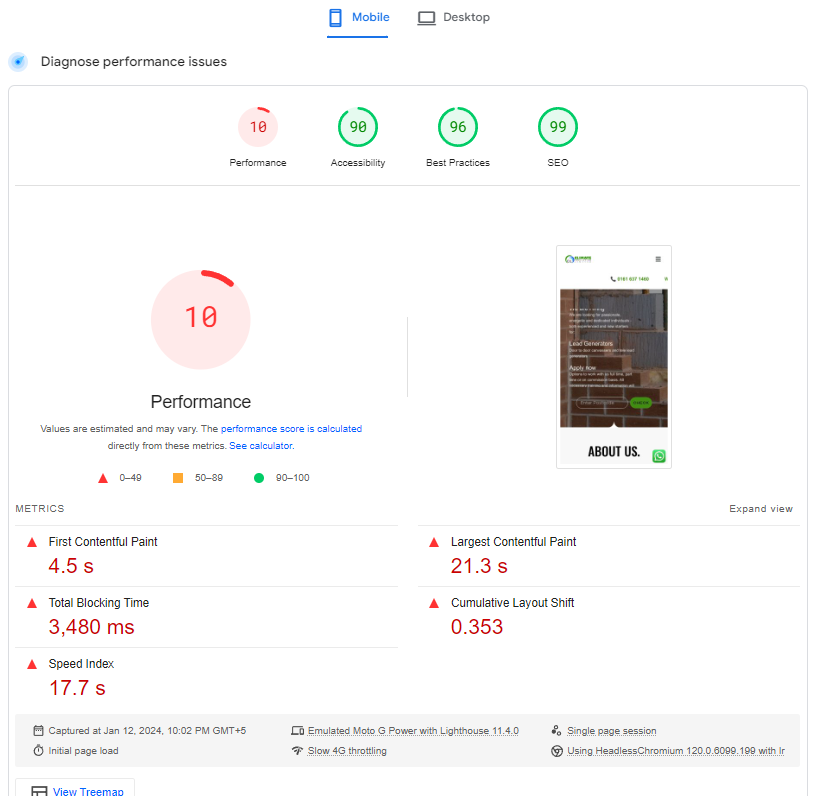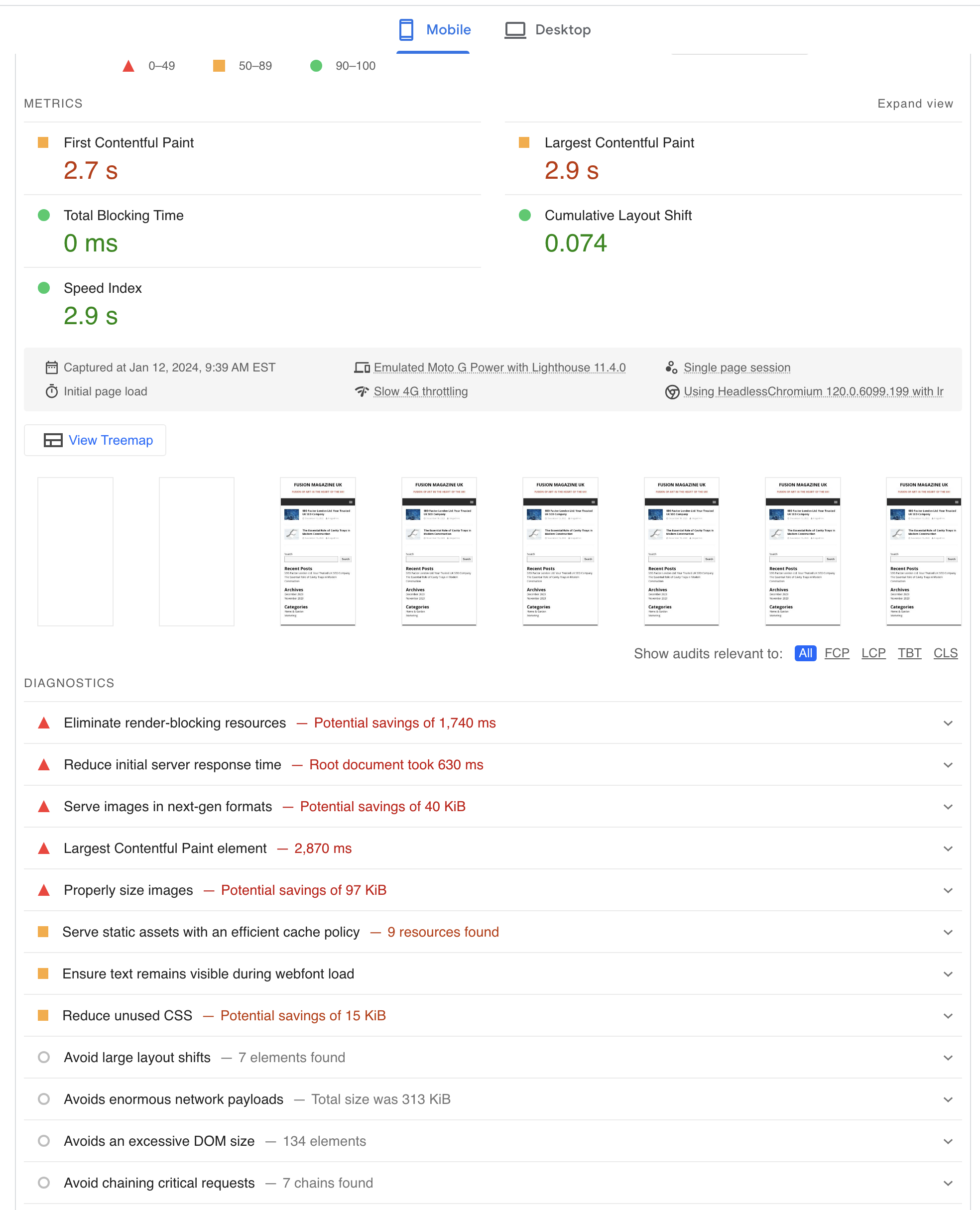Moz Q&A is closed.
After more than 13 years, and tens of thousands of questions, Moz Q&A closed on 12th December 2024. Whilst we’re not completely removing the content - many posts will still be possible to view - we have locked both new posts and new replies. More details here.
How to Boost Your WordPress Website Speed to 95+ (Without Premium Plugins)
-
I'm reaching out for some advice on improving my WordPress website's speed. I'm currently using a free theme for this fusion magazine and aiming for a score of 95+ on Google PageSpeed Insights. I'm aware that premium plugins can significantly enhance performance, but I'm hoping to achieve similar results using primarily free solutions and manual optimizations.
-
Optimize Images: Compress and resize images to reduce their file size, improving page load times. Tools like TinyPNG or WP's built-in options can help achieve this.
Leverage Browser Caching: Configure browser caching through your .htaccess file or a free caching plugin to store static resources locally in users' browsers, decreasing load times for returning visitors.
Minify CSS, JavaScript, and HTML: Remove unnecessary code and whitespace from your website's files. This can be done using free plugins or by manually editing the files to enhance performance.
For comprehensive improvements, consider utilizing professional WordPress Development Services to tailor optimizations specific to your site's needs.
-
Use LiteSpeed cache free version for speed optimization. Upload images in webp format. If possible, host images on a subdomain. Could you check this website as a sample?
-
@mohammadrehanseo Hello Friend!
In my observation and results now I only use the LiteSpeed cache plugin to increase the speed as LiteSpeed cache plugin has updated its features and more user-friendly interface you have to choose the pre-written template to increase the speed you can check one by one all the template to increase speed. I have increased my speed from 55 to 99 on my two websites you can check them if you want and you can also take my help if you want here these are my two websiteThis is one of the most easy method to increase the speed I have ever used
-
@mohammadrehanseo I am eager to tell you that WordPress speed optimization is my profession. So you may just focus on this list and forget about the rest. You should consider the following:
- HTML caching on the CDN (not only the host)
- Redesign or rethink about the main thread of work (JavaScript execution)
- rearrange the ATF objects and dont lazy load if image or video and don't use web fonts if paragraph or any kind of text.
- Extract the Critical Path CSS style definitions and put it into the head section and request for the rest as a separate external CSS file
- configure asset caching
You may find some other useful tips on WordPress Speed Optimization page on Stack Exchange
-
For boosting your WordPress site's speed, especially for a site like whatsgb, focusing on optimizing images, leveraging caching, and minimizing plugins can make a big difference. Consider using a lightweight theme and ensure your hosting provider is optimized for WordPress. These steps, combined with careful optimization, can lead to significant improvements without solely relying on premium plugins.
-
Please look at my website, there is no way to achieve a result of more than 45. (((
-
the process of boosting you WordPress website speed is first to optimize your images, CSS files and clear the caches of your website
-
Choose a fast hosting provider with SSD storage.
Use a lightweight theme and delete unused plugins.
Compress images and use lazy loading.
Set browser caching and use caching plugins.
Minify CSS and JavaScript files.
Use a CDN like Cloudflare.
Optimize the database and enable GZIP compression.
Address server response time issues.
Optimize the homepage and landing pages.
Use Google PageSpeed Insights for analysis. -
Hi,
I am sharing my experience of boosting the WordPress website. If you will follow my suggestions then you will be boost your website speed. Wp rocket is the best plugin for optimizing the website speed.
So sit on Gazebos take your laptop and work on your WordPress website and boost up. -
Great tips! Improving WordPress speed without premium plugins is a game-changer. Your guide provides practical insights for optimizing performance, making it accessible to all. Website globalfist.com speed is crucial for user experience and SEO, and your suggestions offer a valuable solution for WordPress users. Thanks for sharing these effective strategies!
-
I tried very hard to work on climateretrofit.co.uk for page speed especially by minimizing the and using webp images but still performance is very very bad and webpage loading time is very high. Additionally DA is very low, i am working on this website almost from 2 years but still not very satisfied. What should I do?


-
@mohammadrehanseo I just analyzed your site:

Desktop score is OK, mobile one needs some work.
Here is what I would do based on my optimization experience and what PageSpeed Insights for your site are suggesting:
- Install a free caching plugin, I've heard a free module Cache Enabled from KeyCDN is OK, just google for alternatives
- Move Javascript to the bottom to improve Start Render Time, there are free plugins for it
- Convert images to WebP and AVIF formats for lower weight. Use picture HTML5 tag to fallback to png or jpeg for browsers that don't support WebP/AVIF
- Use bigger TTL (about a year) for static content
-
@mohammadrehanseo You can use the LiteSpeed cache free plugin for speed optimization and no need to buy premium. I am also using it on a site FIFA 23 for Android and it's working well.
-
@mohammadrehanseo
<a href="faisalmover.com.pk">faisal movers</a> Please guide me.
Got a burning SEO question?
Subscribe to Moz Pro to gain full access to Q&A, answer questions, and ask your own.
Browse Questions
Explore more categories
-
Moz Tools
Chat with the community about the Moz tools.
-
SEO Tactics
Discuss the SEO process with fellow marketers
-
Community
Discuss industry events, jobs, and news!
-
Digital Marketing
Chat about tactics outside of SEO
-
Research & Trends
Dive into research and trends in the search industry.
-
Support
Connect on product support and feature requests.
Related Questions
-
Moz API Spam Score - Backlinks
Hi, everyone I am trying to get my website DA up. I have analyzed my competitors and thanks to Moz I have idea and insights of how my competitors get backlinks. But, some of them are old school techniques. Also my website has some PBNs no follow backlinks does it affect my website ranking? Their spam score is 10-40. But other competitors has them as well. Does anyone know indepth on this topic?
Link Building | | RejinKayastha1 -
Strategies for Enhancing Lead Generation from Blog Posts
Hello Moz Community, I've been running a blog ( www[dot]arrify[dot]com ) for a while, focused on Salesforce. I'm looking to enhance my lead-generation efforts through my blog content. I would appreciate insights and strategies on the following: SEO Best Practices: How can I optimize my blog posts for better search engine visibility to attract more potential leads? Content Engagement: What types of content (e.g., infographics, videos, in-depth guides) have been most effective for engaging readers and encouraging them to provide their contact information? CTA Placement: Where is the most effective placement for calls-to-action within a blog post to maximize lead capture without detracting from user experience? Lead Capture Forms: Are there any recommended practices for designing lead capture forms that encourage sign-ups? Any specific examples or case studies would be greatly appreciated. Thank you in advance for your help!
Content Development | | Kritikgarg0 -
Unsolved Google URL inspection live test rendering issue.
Hi Everyone, This is my first post on Moz. I have been trying to get this thing sorted and have read everywhere and everyone just says don't worry about it. I would really like some advice/suggestions on this it will be really helpful. When I use the Google URL inspection tool from the Google search console the page rendering is completely broken. The tool refuses to load resources each time. At end of the day that's how the website is rendered in Google cache. I have already tried disabling cache plugins and Cloudflare but nothing works. site - nationalcarparts.co.nz
Support | | caitlinrolex789
This is how it renders when using URL inspection tool -
https://prnt.sc/7XKHtEU01gEl and if you check cache:https://nationalcarparts.co.nz this is how Google is caching it. Plugins I am using - Elementor Version 3.6.1, Elementor Pro Version 3.6.4, Exclusive Addons Elementor Version 2.5.4, Exclusive Addons Elementor Pro Version 1.4.6, WP- rocket, Cloudflare Pro plan with the plugin. Please if someone has fixed this issue and has a possible solution for it. Thanks cacheissue1.PNG1 -
Using 2 cache plugin good or not?
Hi, Can anyone tell me - whether using 2 cache plugin helps or it cause any issue? Besides, when i used w3 cache plugin in WordPress its found like inline CSS issue to get cleared. So, i tried auto optimized but my website Soc prollect gone crashed in between while using the some. Is there any solution and can anyone tell me which plugin advantages to speed the site by removing java script and inline css at a time.
Technical SEO | | nazfazy0 -
What should I name my Wordpress homepage?
I work almost exclusively in wordpress now. And I always hesitate when it comes to naming a site's homepage. I have to give it a name - right? I usually pick the business name or /home. And then that is identifies as the site's static homepage in the Wordpress settings and it works just fine. But I've started to get warning that it is an issue because it creates redirects. For example, I just ran the Ryte service analysis on a website and it warned me about "Non-indexable pages with high relevance" and it's basically my homepage that has 29 incoming links that "passes all pagerank to https://ourdomain/home But what am I supposed to call my homepage if not "Home"? It's not like the old days where anyone has to type it in. The root domain loads the homepage just as it should. Can anybody advise me regarding best practices for what to name a Wordpress homepage for good SEO? With thanks in advance for your help.
Technical SEO | | Dandelion0 -
Barba Plugin and SEO
Hello, community! My client wants to use the barba.js plugin for their new site. What are the implications for SEO?
Technical SEO | | SimpleSearch0 -
Why add .html to WordPress pages?
A site I may take over has a plugin that adds .html to the pages. I searched online but I’ve only found how to add it rather than why to add it. Is it needed? If I remove it, I’ll have to be careful with SEO / indexed pages and redirects. The site is running 3.x.x and 90% of the plugins have not been updated in over 5 years including this one. Before I update to 4.7.x, I am trying to understand the landscape (pros / cons) on why something could be used and if I need to find a suitable replacement for it.
Technical SEO | | acktivate2 -
Urls with or without .html ending
Hello, Can anyone show me some authority info on wheher links are better with or without a .html ending? Thanks is advance
Technical SEO | | sesertin0